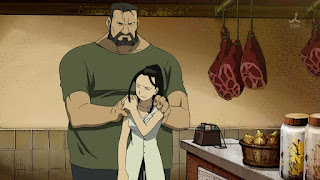Short discussion that covers some of the characters from the Seven Deadly Sins (2014) and Fullmetal Alchemist Brotherhood (2009)


 I’ve been in an anime mood lately, and had a hard time thinking about examples of the gaze in contemporary (American) movies and series. I will therefore be focusing on the gaze in Japanese anime. Anime is an incredibly broad genre of animated series and movies in Japan. A couple of genres are sports, sci-fi, history, fantasy, slice of life, shoujo and shounen. I have only seen the tip of the iceberg, and for that reason I don’t feel like I can cover the whole genre that is anime, or make statements that are true for every genre in anime.
I’ve been in an anime mood lately, and had a hard time thinking about examples of the gaze in contemporary (American) movies and series. I will therefore be focusing on the gaze in Japanese anime. Anime is an incredibly broad genre of animated series and movies in Japan. A couple of genres are sports, sci-fi, history, fantasy, slice of life, shoujo and shounen. I have only seen the tip of the iceberg, and for that reason I don’t feel like I can cover the whole genre that is anime, or make statements that are true for every genre in anime.
I’ve been watching anime since I was little and something that has been bothering me for a while now is the way some female characters are presented. The shy, submissive, reserved women with high voices* who appear weak and sometimes hyper-feminine. They usually stand at the side line while the men fight, struggle, and win. I feel like this is such a clear reflection of how men want women to be, the male gaze plays an incredible role in anime and it reminds me of Mulvey: “Traditionally, the woman displayed has functioned on two levels: as erotic subject for the characters within the screen story, and as erotic object for the spectator within the auditorium, with a shifting tension between the looks on either side of the screen.” (838) I usually stop halfway the series when such characters are presented. However is it sometimes the case that there is a development, and the woman actually turns out to have a special ability (Elizabeth in Seven Deadly Sins, 2014). But in the end, nothing is done about her appearance, attitude, or voice, and in the spectator’s eyes she stays an object.
Of course, I am overgeneralising, I have seen strong female characters in anime as well. For example Olivier Armstrong and Izumi Curtis in Fullmetal Alchemist Brotherhood (2009). These women are mentally and physically strong, impressive and scary (for some of the male characters). However is Olivier a major general in the army, and has the nickname “Ice Queen” due to her harsh personality but beautiful appearance. She has no children or husband nor does she have the wish to have them. In her case, she abandoned the things that bound her to being a “traditional woman” (especially in Japanese terms)**, to gain strength and respect. She has a low voice, and many people are scared of her. All these things that make her character a strong woman, are actually all because she behaves more “like a man”. Izumi is partly the same story, a low voice, a strong appearance of a woman, mentally and physically a beast. But she does have a very large loving husband, that brings out her “feminine” side. But even though these women are not as easy to objectify by the spectator as Elizabeth, doesn't mean it doesn't happen.
I am all for strong female characters, not just in anime, in real life series/movies as well. However the way they are created, the masculine (personality) traits they posses mixed with a very feminine body, is perhaps still problematic. But maybe I am still looking too much through a masculine/feminine pair of glasses, and shouldn't try to label them. Then again, I have to to analyse it in the way the characters are made and presented by the artist. In conclusion, there is a lot to say about this topic, I’ve only grasped a small part of it without any further deeper analysis of for example the history behind depicting women in anime in certain ways.
*The pitch of a voice says a lot about a characters personality. Perhaps more in Japanese culture than in Western culture. That’s why in the case of women, if they have a low voice, it really means they are stronger or more independent, more confident. If they have a high voice it makes them really “girly”. Young, innocent, naive.
**A short background on equality and ideologies in Japan. Considering Japan as quite a modern and “Western” country, the (lack of) gender equality in society and culture is sometimes hard to swallow. For example, the expectations that many men still have of women considering family life is that the woman quits her job as soon as she gets pregnant and sometimes even as soon as she gets married. She then becomes full-time housewife to take care of her husband and kids. Of course shifts are taking place and women and some men start to reject this ideology. However do employment markets and other economical, political and social forces make it hard for things to change.

Geen opmerkingen:
Een reactie posten